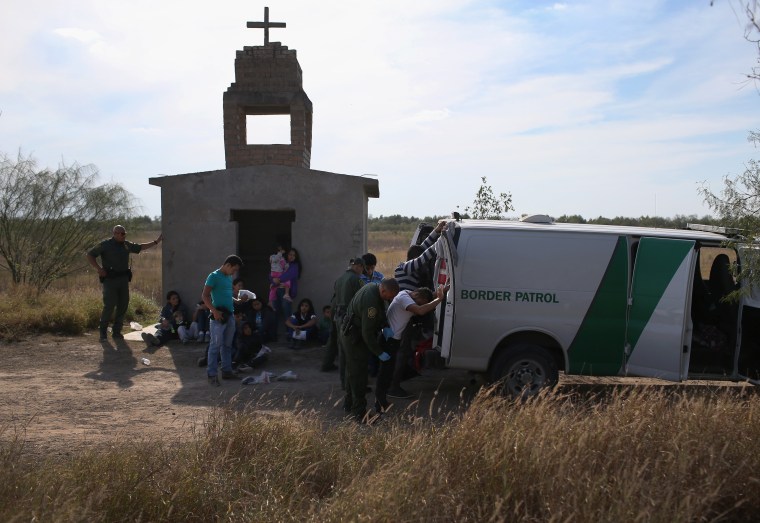At least 270 advocacy and other groups are turning up pressure on the administration to grant temporary protected status for Central American migrants who arrived at the U.S. border in the summer of 2014.
The groups argue in a letter planned for delivery Monday that 17,500 deaths in Central America’s Northern Triangle – Honduras, Guatemala and El Salvador – last year was outstripped the death tolls of four West African countries struggling with the Boko Haram insurgency and higher than the death tolls in Somalia, Libya and South Sudan.
“To put this endemic violence into perspective, Honduras alone had more homicides than 28 states in the European Union combined in 2014,” the groups state in the letter.
The administration has taken the view that it must prevent a repeat of the arrival of tens of thousands of families and children at the U.S. borders seen in the spring and summer of 2014. There has been concern about the danger of the journey, particularly for young children, but also the administration's policy during Obama's presidency has considered people who have recently crossed the border illegally as a priority for departure.
The government began arresting people, including children, who had been denied stays of deportation by immigration judges. Some have been deported, while others are waiting and some have won opportunities to pursue further legal relief.
The arrests, which began New Year's Eve weekend, have stirred outcry among immigrant and Latino groups. All three Democratic candidates have called for the arrests to end. Democratic members of House and Senate also have urged the administration to do so.
Related: Central Americans Picked Up In Raids Get Deportation Pause
The administration has set up processing for asylum requests in the three countries and Congress approved a $750 million aid package to help the three countries target the violence and for other projects.
Simon Rosenberg, founder of the New Democratic Network, defended the administration’s approach saying the debate around the Central American migrants can’t be had outside the context of the broader immigration system. The discussion is being had at a time when there are 60 million to 70 million refugees in the world and failed states, he said.
“The refugees and what’s happening in Central America can’t happen in a vacuum,” Rosenberg said.
But the advocates argue the U.S. has acknowledged that the migrants are refugees by setting up the asylum screening in their countries and have pointed to the pullout of the Peace Corps from the region as evidence of the violence there.
“Knowing the violence that is occurring in these countries, and how their governments have failed to keep their own citizens safe, it would be unconscionable to deport anyone there at this time. It is exactly the type of situation TPS is intended to address,” said Royce Murray, policy director of the Heartland Alliance’s National Immigrant Justice Center, an organizer of the letter.
Temporary Protected Status, known by its abbreviation TPS, was created as part of the 1990 Immigration and Nationality Act.
Recipients are not granted legal status, but are protected from deportation and allowed to work. The protection applies to people already here when the TPS is officially designated.
To get the protected status, individuals must register and pay a fee to the federal government.
Today 13 countries have TPS: El Salvador, Guinea, Haiti, Honduras, Liberia, Nepal, Nicaragua, Sierra Leone, Somalia, South Sudan, Sudan, Syria, and Yemen. It is provided for people from countries with ongoing armed conflict, environmental disaster or “extraordinary and temporary conditions” that prevent people from returning to their country.
“TPS is not a replacement for much needed immigration reform but given the increasing rampant violence in Central America and the extreme danger that migrants who are repatriated face, it is an important humanitarian tool that can to help save lives right now,” said Ashley Feasley, director of advocacy at the Catholic Legal Immigration Network, Inc. which signed the letter.
A recent report by Immigrant Legal Resource Center found that about 1.2 million people would be eligible for TPS if granted, but about 757,000 would actually sign up for it.
A number of Central Americans have been living in the country with TPS for more than a decade. For example earthquakes in El Salvador in 2001 and Hurricane Mitch in 1998 prompted the extension of TPS for people from Nicaragua and Honduras.
According to Migration Policy Institute about 340,000 people in the U.S. hold TPS, including some from countries outside the Central America, such as Liberia and Haiti.
TPS applies to people in the U.S. when the disaster or other condition strikes. The status that prevents their deportation from the U.S. and allows individuals to work, does not provide a path to legal status. In fact, the intent is that the individuals will eventually return to their country when conditions improve.

